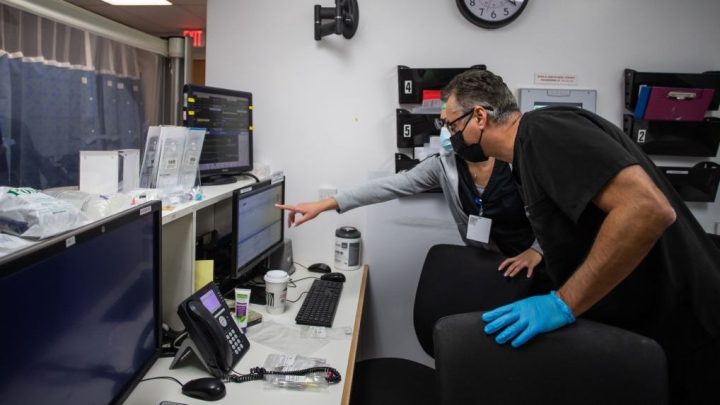
In our fragmented health care system, access to information may be the biggest risk
In our fragmented health care system, access to information may be the biggest risk

It’s easy to assume that when you go to the doctor, they’ll have access to your medical history, especially with electronic medical records becoming the norm. But in reality, those records don’t always translate between health care providers, and that can lead to all sorts of problems.
“One of my patients could have received care at a health care facility literally just up the street from me, but when they transfer from that facility over to my office, I don’t always have access to the medical records that were kept there,” said Dr. Ilana Yurkiewicz, a primary care physician and oncologist on the faculty at Stanford Medicine. “As it stands, our electronic medical records are extremely disorganized.”
Yurkiewicz wrote about providers’ struggles to get information and how that impacts patients in her book, “Fragmented: A Doctor’s Quest to Piece Together American Health Care.” According to Yurkiewicz, when the records fail, it’s often on the patients themselves to fill in the gaps.
“I write about medical errors and near-misses that can happen to patients, and particularly the patients who are less equipped to keep their storylines straight,” she said in an interview with “Marketplace” host Kimberly Adams. “They — in my view — undeniably receive worse care when the burden is placed on patients and loved ones to stitch the pieces of their medical story together.”
While Yurkiewicz is ultimately hopeful that the system can be improved, she also provides advice on what information patients should have accessible to communicate their medical history effectively, should the need arise. The following is a checklist of that information, excerpted from the book.
The Full Story: A Patient’s Checklist
In our fragmented medical system, you are the only guaranteed source of continuity in your own care. Here is some of the information it’s helpful to have on hand.
Personal Info
- Name:
- Date of birth:
- Phone number:
- Address:
- Emergency contact:
- Height, weight:
- Blood type:
Care Team
- My primary doctor:
- My specialist doctors:
- My other providers (e.g., mental health therapist or nutritionist):
- My health insurance carrier:
Chief Complaint
- I am here today because (e.g., “My chest hurts”):
- This has been going on for (e.g., “a few
months”): - The problem feels better when (e.g., “I take two extra-strength Tylenols”):
- The problem gets worse when (e.g., “I lie flat at night”):
Medical History
- Medical conditions (e.g., diabetes, cancer, heart disease, arthritis):
- Surgeries (when, where):
- Hospitalizations (when, where, and reason):
- Past treatments (e.g., chemotherapy, radiation therapy):
Medications
- Prescription medications (name, dosage, and how often I take):
- Over-the-counter medications:
- Other supplements, such as vitamins or herbs:
- Pharmacy where I pick up medications:
Allergies
- Allergies to medications:
- Allergies to anything else a doctor may give (e.g., IV contrast):
- What happens during an allergic reaction (e.g., “I get itchy”):
Immunizations
- Vaccines in the last ten years:
Tests
- Blood tests done recently:
- Imaging (e.g., X-rays, ultrasound):
- Pathology results (e.g., Pap smear, biopsy):
- Procedures (e.g., stress test, colonoscopy):
Health Habits
- Alcohol (how many drinks per week):
- Tobacco (how many packs a day and for how many years total):
- Drugs (what kind and how they are taken):
- My exercise routine:
- My diet:
- My sleep:
- My mental health:
Family History
- Medical conditions in first-degree relatives (parents, siblings, and children):
My Wishes
- Do I have an advance directive indicating my wishes in the case of a medical emergency?
- What does it say?
- Durable power of attorney (this names the one person I’d like to make medical decisions on my behalf if I cannot)
Reprinted from “Fragmented: A Doctor’s Quest to Piece Together American Health Care.” Copyright (c) 2023 by Ilana Yurkiewicz, MD. Used with permission of the publisher, W. W. Norton & Co., Inc. All rights reserved.”
There’s a lot happening in the world. Through it all, Marketplace is here for you.
You rely on Marketplace to break down the world’s events and tell you how it affects you in a fact-based, approachable way. We rely on your financial support to keep making that possible.
Your donation today powers the independent journalism that you rely on. For just $5/month, you can help sustain Marketplace so we can keep reporting on the things that matter to you.












